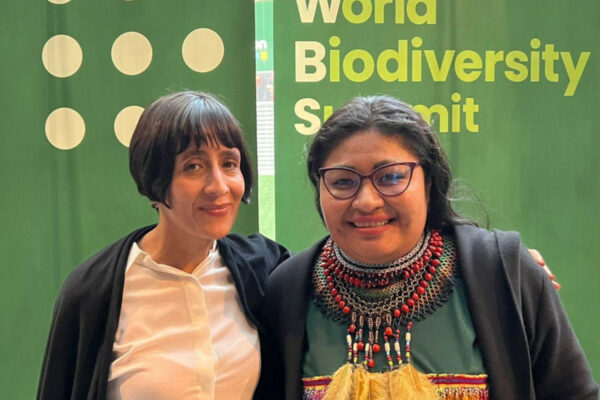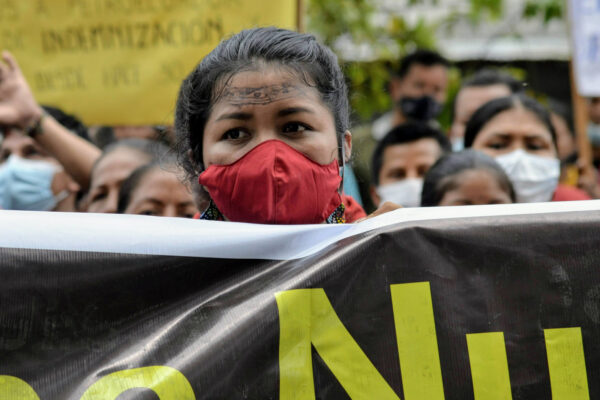San Francisco – It’s one of the richest ironies of the 2000 presidential race. Despite running a Teflon primary campaign, probable Democratic nominee Al Gore (news – web sites), a published environmental crusader, has found himself repeatedly attacked for his links to Occidental Petroleum.
While Gore has been hatching plans to gain the Oval Office, the California oil company has hatched a plan of its own to drill on the sacred ancestral land of the U’wa Indians in Colombia.
Occidental’s moves have generated a firestorm of protest in environmental circles, and Gore’s ties – his family owns $500,000 worth of shares in the company – have proved too delicious to resist.
With the U’wa tribe threatening to commit mass suicide if Occidental is allowed to drill, the controversy has popped up on nearly every leading news source, from CNN to the New York Times.
But if you look further – as no media outlet has – the conflict gets even more intriguing: How did an obscure South American indigenous group manage to insert itself into the heart of America’s presidential campaign and tar the self-proclaimed environmental candidate with the brush of Big Oil money? It’s all thanks to a savvy online organizing campaign run by the Amazon Alliance, a collective of environmental activists.
In other words, Al Gore has been snared by his own invention.
The Amazon Alliance was formed in 1997 after the U’wa sent out a worldwide plea to environmentalists. The Colombian government, eager to increase its oil revenues, had contracted with Occidental to begin drilling on the oil-rich U’wa land near the Venezuelan border.
The U’wa, who consider oil to be the Earth’s lifeblood, reject all exploration on their land. What’s more, the U’wa has a practical concern: Because Colombia is entrenched in a bloody civil war, left-wing rebels regularly attack oil installations. The U’wa feared they’d become the next target if Occidental, called “Oxy” because of its OXY stock listing, came onto their land.
But despite the stakes, the dispute has all the hallmarks of a back-page story. Like previous environmental battles in Nigeria and Ecuador, the U.S. media show little interest of wading into what readers see as foreign news.
But then came the Gores.
“Just by looking at Oxy’s Web site, we saw that Al Gore Sr. was on the board of directors,” says Shannon Wright, a director at Rainforest Action Network and an organizer of the U’wa campaign. On top of that, it contained information about the $500,000 in Occidental shares. It was just the material to get the campaign against Occidental, “a faceless corporation,” into the spotlight. “It was time to hit the campaign trail,” Wright recalls.
So here’s how they did it: RAN (http://www.ran.org), along with other Alliance members Amazon Watch and Project Underground, created an online activist packet with background information on the U’wa and on Gore’s manifold ties to Occidental. (Gore is executor of his father’s estate, and for nearly a decade starting in 1974, Gore collected $20,000 a year in mining rights on land he owned and leased to the company).
For an added touch, the groups included a downloadable anti-Occidental flier. Then the activists sent out the packet to dozens of environmental groups for posting on their Web sites. To kick-start the groundswell, the group e-mailed progressive listservs with thousands of subscribers. And then they waited.
Within a week, the Gore campaign was dogged by hundreds of quickly assembled U’wa protests, all relying on the Web operation but none of them directly coordinated by the Alliance. RAN’s Web site received over 20,000 hits a week. The strategy “reached thousands of activists in hundreds of cities across the U.S,” Wright says. “It’s the sort of organizing that couldn’t have happened five years ago.”
Prodded by the mushrooming protests, major news organizations picked up the scent, with the Alliance Web site serving as a one-stop source for research – albeit from one perspective – on the U’wa-Gore issue. The Internet operation helped even the odds against Occidental’s corporate PR juggernaut.
The Internet “has given grassroots organizers the power of a large political machine or a multinational corporation,” says Steve Kretzmann, a consultant for Amazon Watch and architect of the U’wa campaign.
Last month, the vice president came face to face with his Net bete noirs at a campaign rally in the San Francisco Bay Area. After Wright, Kretzmann, and other Amazon Alliance members heckled his speech, Gore, now well aware of the U’wa campaign’s strength, agreed to sit down with them.
“He certainly listened to what we had to say but also told us he didn’t feel he had a special responsibility in this issue,” Kretzmann says. “We told him he did. We definitely hit a nerve.”
The Gore campaign, which has always maintained that Gore’s relationship to Occidental is minimal and that the issue has been blown out of proportion, didn’t return calls for comment.
The Amazon Alliance isn’t letting up. Although they are unlikely to get any support from Gore’s Republican opponent – George W. Bush (news – web sites) was practically born at an oil well – Amnesty International, the Sierra Club, and Friends of the Earth have expressed an interest in joining the campaign.
Now the Alliance is revving up for the general election. “The primaries were just the beginning,” Wright says.













